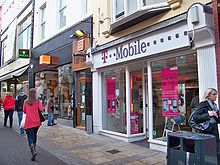- T-Mobile (UK)
-
T-Mobile UK 
Industry Telecommunications Founded 1993 (as Mercury One2One) Headquarters Hatfield, England, UK Area served United Kingdom Products Mobile telecommunications products and services Parent Everything Everywhere Website http://www.t-mobile.co.uk T-Mobile UK is a mobile network and mobile broadband operator in the United Kingdom. It is owned and operated by Everything Everywhere, the UK's largest mobile network.
Contents
Company history
T-Mobile UK started life as Mercury One2One, a GSM mobile network operated by the now-defunct Mercury Communications.[1] Later known simply as One2One, it was the world's first GSM 1800 network[2] when it was launched in September 1993. In its final days it was operated as a joint venture between Cable and Wireless and American cable provider Mediaone Group, which had a number of investments in Britain dating back to its days as the US West Media Group. One 2 One was purchased by Deutsche Telekom in 1999[3] and rebranded as T-Mobile in 2002.[4]
T-Mobile offers both pay-as-you-go and pay-monthly contract phones. The pay-monthly contracts consists of set amounts of minutes and 'flexible boosters' which allow the customer to change them month to month depending on their needs. Prior to this T-Mobile had a contract option known as 'Flext' which gave the user an amount of money to use for calls, texts, MMS and mobile internet as necessary. This was withdrawn in early 2010. There is no warning when pay-monthly customers exceed their monthly inclusive limit, leading to unexpectedly large bills.[5] T-Mobile launched their 3G UMTS services in the Autumn of 2003.
On 12 December 2007, it was confirmed that a merger of the high-speed 3G and HSDPA networks operated by T-Mobile UK and 3 (UK) was to take place starting January 2008. This will leave T-Mobile and 3 with the largest HSDPA mobile phone network in the country, with a theoretical maximum speed of 6.5 Mb/s, rising to 7.2 Mb/s over the course of the year, although HSDPA access is restricted to Web'n'Walk Plus customers and above.
Merger with Orange UK
On September 8, 2009 France Telecom's Orange and T-Mobile parent Deutsche Telekom announced they were in advanced talks to merge their UK operations to create the largest mobile operator with 37% of the market. The long-term future of either brand is unclear though both would be retained for the first eighteen months at least.[6]
Consumer Focus and the Communications Consumer Panel sent a joint letter to the then Competition Commissioner Neelie Kroes in December 2009 asking for the merger to be investigated by authorities in the United Kingdom, rather than Brussels.[7] The British Office of Fair Trading joined this call by asking the EU to allow it to investigate the proposed deal in February 2010, saying that it believed the merger could have a 'significant' effect on competition.[8] On 1 March 2010 the European Commission approved the merger, on the condition that the combined company sell 25% of the spectrum it owns on the 1800 MHz radio band and amend a network sharing agreement with smaller rival 3.[9] On 1 April 2010 Deutsche Telekom and France Telekom finalised the deal and completed the merger of their UK based operations, causing Orange UK and T-Mobile UK to cease to exist, although the brands will be maintained for at least 18 months.[10] On 11 May 2010 it was announced that both the Orange and T-Mobile brands will remain on British high streets, although their new merged parent company will be called Everything Everywhere.[11]
T-Mobile's UK network is also used as the backbone network behind Virgin Mobile (the world's first virtual mobile operator), for both 2G and 3G signals.
Network outage
On 17 November 2009, as reported by Mobiholics.com [1], there was a major network outage in East of England, covering as far as Norfolk, Suffolk, Cambridgeshire & Essex. This was caused by a cut on their fibre cables and had to be repaired by the engineers. This resulted in about 12 hours of network outage.
Personal data sold on in security breach
In November 2009, T-Mobile UK was the subject of an investigation by the British Information Commissioner's Office following the involvement of some T-Mobile employees in the illegal trade of personal data of millions of customers, in breach of the Data Protection Act 1998.[12][13]
On 17 November 2009, T-Mobile admitted that it faced a consumer backlash after it was revealed that due to its own lax data security controls an employee had been selling customer data to third party companies. The mobile operator admitted that one of their own employees is facing prosecution after selling personal details of thousands of British customers to rival companies in a major breach of UK data protection laws. UK Information Commissioner Christopher Graham said the data was sold for “substantial amounts of money” to brokers working for other mobile phone companies. The privacy watchdog said it planned to prosecute and would push for jail terms for anyone convicted. Rival companies bought the information and used it to make cold calls to the customers offering them a new contract with a new network.[12]
Mobile broadband fair use policy change
Effective February 1, 2011 T-Mobile UK lowered their fair-use capacity limit on Internet usage from 3GB to 500MB per month and clarified that Internet access using their mobile broadband service in reality only allows browsing the Internet using static websites. T-Mobile says:
"Browsing means looking at websites and checking email, but not watching videos, downloading files or playing games. We've got a fair use policy but ours means that you'll always be able to browse the Internet, it's only when you go over the fair use amount that you won't be able to download, stream and watch video clips."[14]
This will effectively limit customers ability to use services such as Video chat/conference, Online streaming radio/TV news etc. or accessing e-mail attachments and playing online games or even downloading updates. In general this must be considered a very archaic approach towards internet content availability, particularly given the growing popularity of online services and smartphone market penetration.
The initial reports were that this was for all users, but after threats of contract breaches it was announced that it would apply to new and upgrading customers only - existing contracts would be honoured.
References
- ^ "Mercury One-2-One challenges the U.K. cellular competition, Mobile Phone News, 13 September 1993 "
- ^ http://www.gsmworld.com/about-us/history.htm
- ^ "One 2 One sale agreed". BBC News. 6 August 1999. http://news.bbc.co.uk/1/hi/business/413371.stm. Retrieved 27 March 2010.
- ^ One 2 One to rebrand as T-Mobile
- ^ http://www.mobiletoday.co.uk/News_Special/T-Mobile_refreshes_consumer_price_plans/T-Mobile_refreshes_consumer_price_plans.aspx?cid=63532
- ^ "T-Mobile and Orange in UK merger". BBC News. 2009-09-08. http://news.bbc.co.uk/1/hi/business/8243226.stm. Retrieved 2009-10-14.
- ^ Co-signed letter to European Competition Commissioner in relation to joint venture between Orange and T-Mobile Consumer Focus/Communications Consumer Panel. 21 December 2009
- ^ "Orange and T-Mobile deal 'threatens competition'". BBC News. 3 February 2010. http://news.bbc.co.uk/1/hi/business/8243226.stm. Retrieved 1 March 2010.
- ^ "Orange and T-Mobile cleared for mobile merger by EU". BBC News. 1 March 2010. http://news.bbc.co.uk/1/hi/business/8243226.stm. Retrieved 1 March 2010.
- ^ http://androinica.com/2010/04/01/t-mobile-uk-and-orange-uk-complete-merger/
- ^ "Orange and T-Mobile merges as 'Everything Everywhere'". Daily Mail (London). http://www.dailymail.co.uk/money/article-1277392/Orange-T-Mobile-merges-Everything-Everywhere.html?ito=feeds-newsxml.
- ^ a b "T-Mobile staff sold personal data". BBC News. 17 November 2009. http://news.bbc.co.uk/1/hi/uk/8364421.stm. Retrieved 17 November 2009.
- ^ "Mobile phone customers’ records are sold illegally". Information Commissioner's Office. 17 November 2009. http://www.ico.gov.uk/upload/documents/pressreleases/2009/mobile_phone_records_s55_171109.pdf. Retrieved 17 November 2009.
- ^ "T-Mobile UK Decides Mobile Broadband Shouldn't Actually Be Used For Mobile Broadband". Techdirt.com. 2011-01-11. http://www.techdirt.com/blog/wireless/articles/20110110/14253812597/t-mobile-uk-decides-mobile-broadband-shouldnt-actually-be-used-mobile-broadband.shtml. Retrieved 2011-01-17.
UK mobile network operators UK mobile virtual network operators Asda Mobile · BT Mobile · Dalya Mobile · Delight Mobile · Dialog Vizz · iCard Mobile · Family Mobile · Giffgaff · KiteMobile · Lebara Mobile · LycaMobile · Now Mobile · Priyo Mobile · Stan Mobile · Talkmobile · Telecom Plus · Tesco Mobile · Tru · UK01 · Vectone Mobile · Virgin MobileCategories:- Mobile phone companies of the United Kingdom
Wikimedia Foundation. 2010.


